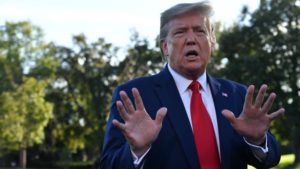
American foreign policy is increasingly falling into disarray and incoherence. President Trump’s doctrine of principled realism, in my opinion, is the correct approach. Principled realism in international politics where nations go to war, however, requires disciplined leadership and decision-making to ensure the world does not resort to unnecessary violence. Any willingness to forego a sense of global responsibility should give pause to American citizens, allies and partners. The question here is whether this doctrine of principled realism has devolved to unprincipled realism to endemic confusion.
The National Security Strategy (NSS), signed by President Trump, provides the whole of U.S. government with national security interests and priorities, and details country and other threats to domestic and international well-being. American foreign policy actions and decisions, however, continue to have the opposite effect. The administration’s inability to follow national security decision-making processes to align U.S. words and actions within the NSS prevent America’s ability to effectively deter, deny and defeat, if necessary, adversaries of the United States. Deterrence is failing not because of talent and equipment, but because of leadership and responsibility.
In Asia, Trump spurred North Korea’s nuclear weapons program by cozying up to Kim Jong Un. In turn, the region is experiencing an increasingly aggressive forward posture and presence of Russian and Chinese activities. In July, a Russian bomber entered South Korean airspace in joint operations with China. And in the past couple years, China threatened economic sanctions against South Korea if they deployed a U.S. ballistic missile defense system.
South Korea’s desire to maintain peace and stability on the peninsula with North Korea has contributed to a deterioration in Seoul-Tokyo relations. Seoul abandoned an important military intelligence-sharing agreement with Tokyo that was aimed at deterring North Korean actions. In July, a South Korean court determined that Japan must compensate South Korean workers for forced labor during the war. Japan, in response, took steps to remove South Korea from its list of trading partners.
These developments have tremendous impacts on the regional security in Northeast Asia. The United States has formal mutual defense treaties with South Korea and Japan. Many factors contributed to this devolvement in stability and security in this region. But, candidly, the Trump administration veered from principled realism. He appears unwilling to lead and adhere to its responsibility embedded in mutual defense treaties that provide the U.S. regional power and influence.
In Europe, Trump is disavowing the transatlantic alliance in favor of maintaining positive relations with Russia’s Vladimir Putin, while furthering American isolation and criticism of NATO and the European Union. NATO and the EU already are experiencing fractures in their ability to defend the European landmass from Russian aggression — whether in the form of disinformation or annexation of Crimea and parts of Ukraine. European fecklessness — such as dealing with Iran, poor military readiness and the EU’s inability to build consensus into action — has contributed to the problem.
The lack of principled diplomacy in Europe creates a few serious concerns for the future. First, any separation between NATO and the EU creates opportunities for Chinese influence in the region. Second, European governments face anemic growth and some governments, such as Italy, are shifting towards nationalistic forms of governance. Third, Russian actions in Ukraine still present a threat; simmering tensions in Eastern European states provide Russia with opportunities; and — most dangerous — Russia’s adventurism into Syria and developing relations with Turkey create a volatile situation in the Middle East. Trump’s questioning of NATO’s existence and siding with Putin on various issues is unconscionable.
In the Middle East, the president’s decision to withdraw from Syria and allow Turkey to execute its offensive against the Kurds may be the final catalyst for a regional war. A war across the Middle East with modern-day weaponry would be catastrophic on a global scale. There is no other characterization in this foreign policy decision but to call it “stupid.” Sen. Lindsey Graham (R-S.C.) has called it “short-sighted and irresponsible” and “a disaster in the making.” In fact, Turkey and Russia increasingly have partnered with each other militarily, politically and economically, while sidelining the United States and NATO.
This haphazardly created crisis may be unprecedented by a U.S. president. To have a phone call with Turkish President Recep Tayyip Erdogan, and announce this decision via social media, creates a serious humanitarian crisis. And, the decision enables Iranian power and influence by connecting a logistics corridor from Iran through Iraq and Syria and into the territory and hands of Hezbollah. Everyone is listening — Russians, Iranians, Israelis, Saudi Arabia.
Most shocking and, in what may be considered a second thought, Trump tweeted, “If Turkey does anything that I, in my great and unmatched wisdom, consider to be off limits, I will totally destroy and obliterate the Economy of Turkey (as I’ve done before!).” This statement, as ridiculous as it sounds, does not create diplomatic conditions to prevent a massacre of the Kurds. Any “great and unmatched wisdom” would have recognized that this decision would lead to the deaths of U.S. Kurdish allies and innocent civilians, and stronger presence and influence for Russia, Iran, Turkey and Syria vis-à-vis Saudi Arabia and Israel.



